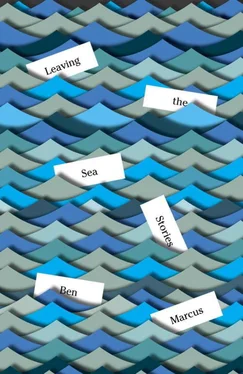Maybe that person shared his name, and looked like him—the poor fuck—but so what. Hayley wanted a stranger— you are dead to me, he wanted to say to himself—and Julian couldn’t help her. Instead of breaking up with your girlfriend, could you break up with yourself ?
“So I talked to your dad,” Hayley said.
“Why?”
“Well…” She looked at him funny.
“Because I wanted to know where you were.” She punched him softly in the arm.
Maybe she wanted to say: play along with this, Julian, please, please, because this is how it works. I am trying so hard right now.
“You knew exactly where I was,” he said. “I’ve been right here the whole time. I’ve been at the clinic every day for two weeks. Where else would I be?”
“I wanted to know that you were doing okay, and, you know, where you were staying.”
“So you asked him?”
“I knew you’d have been in touch with him.”
“Yeah.”
“I can care about you, Julian.”
“I know you can, Hale.”
She could care about him in theory, and maybe in real life, too. But he must have migrated to some third place, because both of those territories seemed very far off to him now.
They crossed the Oberkassel Bridge, where the wind destroyed them, and finally Hayley admitted to being impossibly, horribly cold. And hungry. The poor thing’s nose was running and her face was red and she looked ready to freeze. Could they maybe head back now, she wanted to know? Would he mind so much if they left now?
“Where?” he said.
“To the room.”
“Room? There is no room.” Tombstone.
“At the Am Volksgarten. You know, where we…They had rooms. I didn’t know where you were and you weren’t checked in there.”
“Oh, are you Madame Düsseldorf now? What have you been here for, like eleven minutes? Plus, I have a place to stay. And there isn’t room there for you.”
“What do you mean?”
It took all of Julian’s strength to look away.
“I am perfectly lodged, thank you.” Tombstone.
“Would you please stop it?”
“I doubt it.”
“Jules, please. I want to stay with you tonight.”
He crossed the avenue where they’d stopped and she spoke his name, but not so urgently. This is what a favor looks like, he thought. Probably there was a favor being done right now. Except as he turned uphill and left Hayley behind, he had to wonder who, exactly, was actually doing this favor, and who was the fucking favor even for?
It was getting dark. Soon the hostel lights would go off. The men would tuck in and some of them would be snoring in seconds. The whole room would hum with desire, forty or fifty men trying not to be seen for a little while, even if they crept out at large, into the world. They required darkness for their work. This was where Julian belonged. He wanted to be in bed and ready. Maybe if he was lucky, his visitor would return. His visitor might give him another chance. This time he’d stay in his bed, no matter what. He would not bolt. He’d listen all night for footsteps. If none came, then perhaps he would be the stranger. He would find someone sleeping in the Turnhalle, someone who needed badly to be visited, and he would oblige.
Julian would reach out his hand and he wouldn’t say it out loud, but he could certainly think it. He’d been thinking it for so long now. Wouldn’t you like to join me? And wouldn’t that most perfect phrase serve as the prettiest inscription on the tombstone they would finally place, when the time came, over his grave?
It’s still dark when the weeping erupts, so Mather knows it’s early. How early he isn’t sure, but he won’t be able to fall back asleep, so it doesn’t matter. He pulls the extra pillow over his head, tries to smother the sound, but it’s still there, the distant siren of the boy crying in the other room.
The boy is wedged under the machine when Mather goes in. The machine has run dry again, streaks of pink fluid smeared inside the hose, the tank in the crib issuing an exhausted wheeze. It’s a terrible design. Under the clouded tank is a cavity just large enough to conceal the boy if he crawls in, which is what he does when he wakes up too early and no one comes for him. So Mather has to wedge his fingers beneath the thing, which barely fits in the crib, anyway, and lift it just enough to grab the boy and pull him out.
Of course the boy has been crying. Crying isn’t really the right word for it. He has been explosively weeping, maybe for a long time, and when Mather picks him up and holds him close, the weeping escalates, the boy breaking down in Mather’s arms.
Mather tries to set the boy down in the dark kitchen so that he can make coffee, but as soon as the boy is released he bursts into sobs again. As usual, Mather talks to him, tries to calmly reassure him, but the boy’s crying is so loud that Mather cannot even hear his own voice. He sits on the dirty kitchen floor and gathers the boy in to try to soothe him, but the boy squirms from his grasp and goes on wailing, so Mather leaves the kitchen and shuts himself in the bathroom, triggering even higher-pitched cries from the boy.
When the doorbell rings to signal that Mather’s ride to work is here, he isn’t ready to go. The boy’s diaper was dry when he got up, which meant that he hadn’t had enough water, but Mather could not get him to drink anything. The boy twisted his head away when offered a bottle, so Mather tried to interest him in different cups, even his own coffee mug, which the boy usually tried to pry away from his hands. Finally, the boy took a few greedy gulps from the mug, with most of the water running down his chest. He wouldn’t eat the egg that Mather had prepared for him, but he did steal Mather’s toast, which he squeezed into a gummy mass in his fist while wandering around the living room, still half crying.
Now Mather has to quickly force the boy into his clothing as he struggles to get away. From the hallway, he grabs the same day bag he used yesterday, and the day before, packed with the same spare clothes for the boy and the same dry snacks that he never seems to want.
No one says hello when Mather opens the door of the car-pool vehicle. They have had to wait for him in the unlit garage, and he can tell that they’ve lost patience. There’s no car seat installed today, no space reserved for the boy, and he won’t hold still in Mather’s lap. The woman next to Mather is not amused when the boy throws himself across her legs, trying to crawl toward the window. She sits back, hands up, indicating that Mather must remove the boy himself. Mather apologizes and pulls the boy back, holding him tightly so that he can’t escape. This makes the boy shriek and squirm with surprising strength. But Mather does not relent. He has no real choice.
They pass the old bald hill and the spire, then get waved through at the Faraday gate, where they join the line of cars that form a single file to climb to the top. The little trees out the window are bare and the grass is colorless this time of year, but it’s a bright, clear day. Mather wishes a window was open, but he doesn’t feel that he can ask. No doubt someone decided, before they picked him up, that they’d ride to work with the windows closed, breathing one another’s stale air.
In the parking lot, overlooking the valley, the boy wants to walk under his own power, but there are cars pulling in and it’s too dangerous. Mather finds a little patch of grass for the boy to run around in. It isn’t much, and it quickly drops off into a steep decline, so he stations himself to keep the boy from running down the cliff. For a while the boy staggers around, grabbing little sticks, which he holds up to his father with pride.
Читать дальше












